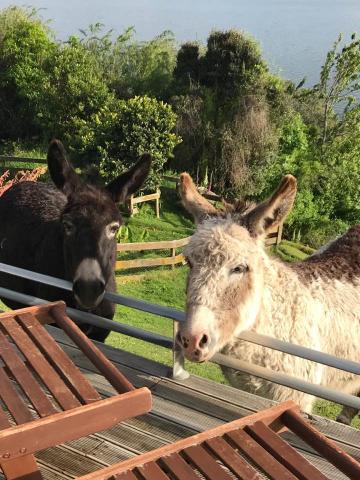

With the hectic holiday season fast approaching, I wanted to drop you a quick note to make sure you didn’t miss any of WalletHub’s recent holiday studies and reports, highlights of which you can find below.
USDA Provides More Than $10 Million to Help Caribbean Area Farmers Recover Following Hurricanes
Applications for USDA Conservation Program Due Jan. 19
SAN JUAN, P.R., November 21, 2017 – USDA’s Natural Resources Conservation Service (NRCS) is providing $10.9 million in technical and financial assistance to help farmers in Puerto Rico and the U.S. Virgin Islands repair damage and rebuild following hurricanes Irma and María. This investment through the Environmental Quality Incentives Program, a Farm Bill conservation program, is one more option available through USDA to aid with recovery.
“USDA remains committed to helping the people of Puerto Rican agriculture with every means at our disposal. With this funding, we can assist local farmers in repairing damages to their land and existing conservation practices caused by Hurricanes Irma and Maria,” said Secretary of Agriculture Sonny Perdue. “Through EQIP, we co-invest with farmers to repair and prevent soil erosion, address flooding and other water quality issues, as well as any other resource concerns resulting from high rainfall events and flooding.”
EQIP Funding for Emergency Assistance
To expedite disaster recovery, NRCS is issuing waivers allowing farmers to receive payment and begin implementing key conservation practices prior to contract approval. Practices can include the disposal of dead livestock, the construction of animal mortality facilities, replacement of roofs and covers on agricultural buildings and debris removal. Participants are asked to file an EQIP application and a waiver to start implementing a practice.
Meanwhile, farmers who have worked with NRCS previously are also eligible to get assistance to implement new conservation practices or repair failed practices.
NRCS accepts EQIP applications year-round in a continuous signup. But landowners must submit their applications by Jan. 19 to be considered for this disaster recovery funding. Farmers and ranchers should visit with their local USDA service center to apply. Caribbean NRCS office listings and phone numbers can be found at www.pr.nrcs.usda.gov. Farmers may also call the Caribbean Area Disaster Recovery Bi-Lingual Hotline at 787-303-0341.
Disaster Recovery Assistance for Caribbean Communities
In addition to assistance to agricultural producers, NRCS is helping local communities repair dams and infrastructure impacted by the hurricanes. NRCS is providing $1.75 million to local governments and entities through the Emergency Watershed Protection (EWP) program to restore damaged and destroyed infrastructure. While EWP generally can pay up to 75 percent of the cost of emergency measures, in both Puerto Rico and the Virgin Islands, President Trump authorized 100 percent Federal cost for debris removal and emergency protective measures until March 2018.
Four NRCS teams spent the last five weeks in the Caribbean region conducting damage survey assessments to determine potential sites and sponsors for EWP projects. Through the program, NRCS works with local government entities in impacted areas to remove debris, stabilize streambanks and fix water control structures, among other practices.
Requests for assistance must be made within 60 days of the storm event.
More Information
Today’s announcement builds on investments USDA has made to support agricultural producers impacted by the hurricanes. USDA’s Farm Service Agency offers multiple programs in Puerto Rico and across the nation to help with disaster recovery, including compensation for livestock death and feed losses, risk coverage for specialty crops, and repair of damaged agricultural and private forest land. Most recently, FSA added emergency assistance for dairies in Puerto Rico to help provide feed for their remaining cattle. USDA’s Risk Management Agency also offers several Federal crop insurance plans, helping producers overcome natural catastrophes.
For more information on NRCS programs and other USDA disaster assistance programs, visit the Disaster Recovery Assistance webpage or contact a local USDA
=====================
GOOD NEWS FOR WILD HORSES & BURROS DRAFT BILL DENIES FUNDS FOR KILLING
COLORADO SPRINGS, CO – Our wild horses and burros received a small victory from the United States Senate this Thanksgiving week.
The Senate Appropriations Committee released a draft version of their Interior Appropriations Bill on November 20, 2017. The draft language maintains protections for our wild horses and burros, and states that they cannot be killed or sold in any way that results in their destruction.
This draft language retains the status quo, meaning our wild horses and burros will be protected as they have been for nearly ten years.
“While this is only a temporary victory, we at The Cloud Foundation are extremely thankful for this good news out of the Senate,” said Lisa Friday, Director of Communications for The Cloud Foundation. “We are so grateful to Senators Murkowski and Udall, and the entire committee, for standing with the wild horses and burros today.”
This draft bill will enable the ranking members of the House and Senate Appropriations Committees to begin negotiations on critical items within their respective draft bills. The House draft bill removed many of the protections for wild horses and burros. Now the negotiations will begin between the two bodies to determine what will end up in the final draft, including whether or not the killing of wild horses or burros will be allowed.
“Our work is not finished, but as we gather with our families to celebrate Thanksgiving, we at The Cloud Foundation are giving thanks not only to the Senators who stood with the wild ones, but also to the American public who spoke up loud and clear,” said Ginger Kathrens, Executive Director of The Cloud Foundation. “The thousands of calls to lawmakers made by wild horse and burro advocates across the country were instrumental in producing today’s good news.”
###
The Cloud Foundation (TCF) is a Colorado based 501(c)3 non-profit organization dedicated to the protection and preservation of wild horses and burros on our western public lands.